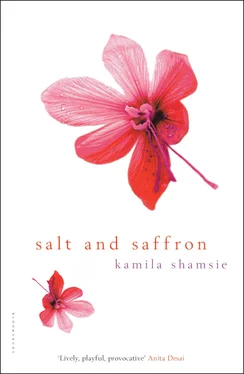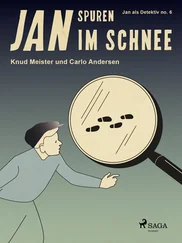‘Can you imagine doing that? Cutting off all contact with me? Or Samia?’
Sameer’s hand touched one ear and then the other. ‘God spare us all from such horrors.’ He said it with a fervour I didn’t expect, and for a moment I thought he was mocking me.
‘There’s a strong chance the bank’s going to post me to Hong Kong. It’s an attractive proposition and God knows there are days I just want to get away from the inefficiency, the violence, the corruption … Fact is, if it happens I’d be stupid to turn it down. Professional suicide. But no place will ever be home like this. And no company is as comforting as the company of family. That’s what I learnt at college.’
I turned off the air conditioner, and rolled down the window. We were much closer to the sea now and, coupled with the speed at which Sameer was driving, it made for a pleasant breeze. I inhaled the musky scent of motia that wafted over boundary walls, and turned up the volume of the stereo. Dire Straits with my perennial favourite, the Brothers In Arms album. This could be any day, any year, in the last decade. Sameer driving, me controlling the music and the ventilation, conversation drifting between what we would do in the future and what we didn’t know about the past, and Sameer as inclined as ever to treat a red traffic-light as a suggestion rather than a command.
Karachi boys have a distinctive one-handed way of driving, though I hadn’t realized that until I went to America. They push their seats further back than is necessary, keep one hand on their left thigh, ready to shift over to the gearbox, extend the other arm forward, absolutely straight, and grip the top of the steering wheel. When the time comes to turn, they unfist their right hand, hold the open palm against the wheel, and make the turn, the circular motion of their hand suggesting that they’re miming the actions of a window-cleaner with a wash cloth. It’s only silly when it isn’t sexy.
‘So, go on. Spill the beans,’ Sameer said.
‘About what?’
‘Who is the “he” you mysteriously alluded to at the airport? The one who bought you coffee?’
‘I was just wondering how he drives. You’d like him. Have you ever been to Liaquatabad?’
‘I hope you’ve just changed the subject.’
‘Why? Dammit, Sameer, why?’
‘Because petrol prices have shot up. Name?’
‘Khaleel. New topic.’
‘Khaleel? So he’s a desi.’
‘New topic, Sameer.’
‘And he lives in Liaquatabad? Aliya, seriously?’
‘New topic. Please. Sammy, please.’
‘Okay. But we’re going to have to talk about this later. Hey, did you hear about Godziloo? The lizard in my bathroom?’
I closed my eyes and leant back. ‘Yes. It was the same colour as the floor and it moved with speed. But go on, tell.’
When I opened my eyes again, the front door of my house was on the other side of the windscreen and my father was leaning in through the window, pulling my nose. ‘Oh, Zsa Zsa GaSnore. Madam Snooze Jahan.’
My mother clipped Sameer’s ear. ‘Sammy, you so-terrific soporific’
Home.
When I finally awoke the next morning, my first thought was that I would see Dadi today. So I skipped over the first thought.
Wasim was in the kitchen, squatting on the floor and kneading flour for chappatis when I pushed through the swing door minutes later. He smiled when he saw me. ‘Who is this guest in the house? The mali was going to water the plants outside your window earlier this morning —’ he gestured as though holding a hose, and produced the sound of spurting water — ‘but I told him not to because it might wake you up. Guests receive every courtesy around here.’
‘I have every expectation that I’ll receive nothing less from you,’ is what I wanted to reply. But my Urdu, never up to par, swapped umeed with amrood and I ended up saying, ‘I have guava that I’ll receive nothing less from you.’
Wasim laughed and put the kettle on to boil. ‘Always thinking of food.’
In Masood’s kitchen, how could it be otherwise? I sat on the counter, with my feet resting on the stool beneath. In the early mornings between waking up and leaving for school I’d sit just so and watch Masood prepare lunch. He was always up by sunrise, preparing the miracles Mariam Apa had asked for the night before. ‘The sun can climb or it can burn,’ he said, more than once. ‘The first stages of the sun’s ascent are the more sheer and slippery. It’s like climbing K2. So Aftab Sahib climbs the sky and does nothing but climb. By the time he is near the top it’s as easy as climbing a hill, so his attention can wander and then he starts seeking out kitchens and angles his rays through the windows.’
My only moment of glory in an Urdu class was when I put up my hand and said, yes, I knew a word for sun other than sooraj. It was aftab. I almost flubbed the moment by appending a Sahib, but decided, instead, that I could be on a first-name basis with someone who Masood referred to with formality.
Wasim asked, ‘Have you started cooking there?’
‘There’ was America. I shook my head. I’d watched Masood cook, seen shape and colour transformed into texture, witnessed odour becoming aroma, observed vegetables that grew away from each other in the garden wrapping around each other and rolling through spices in his frying pan. Cook? I may be proud but I know my limitations.
Wasim handed me a cup of tea and I left the kitchen. When Wasim first came to cook for us, four years ago, I was sure he wouldn’t last. How could anyone attempt to replace Masood? One cook had already tried, but he was gone, passed on to a newly-wed relative just days after Mariam Apa eloped with Masood. But Wasim was different; he recognized, early on, that everyone in our house had some hesitancy about ordering meals and, without question or comment, he took over the kitchen entirely, serving up meals which, by any standards other than Masood’s, were very good indeed. I suppose he must have known about Masood and Mariam. After all, Auntie Tano, the greatest purveyor of gossip in Karachi, reputedly got most of her salacious tidbits from her children’s ayah. Aba, commenting on this, said that if you put together the servant’s information network with that of Dadi’s bridge-playing crowd you’d eliminate the need for Intelligence Services in Pakistan.
I sipped my tea and approached Mariam Apa’s door. Time for the ritual that in the last four years had become an integral part of my first morning home. But there was a Post-it Note stuck on the door, its bright yellow cheeriness disrupting my attempt to evoke a meaningful atmosphere. ‘Child!’ said the note, in my mother’s hand. ‘You’ve just come home after nine months away and we (your parents) aren’t there to feed you buttered toast and rumbletumble eggs when you wake up. Hai hai! Crisis at work. Hotshot politico has decided he wants a longer driveway for more dramatic red-carpet entrances when he’s entertaining VIPS and VVIPS, not to mention VVVIPS. And construction has already started on the house! Real musibat. But we’ll be back for lunch unless death threats happen. You might even still be asleep then, in which case we’ll tear up this note and pretend we were never away. Lots of love, Ami.’ All this on one Post-it Note. She used both sides, but still.
I put it out of my mind, closed my eyes, opened the door, and walked in. Memory conjured up a picture of Mariam Apa’s room as it used to be. On the walls, Sadequain’s pictorial rendition of one of Ghalib’s verses. The illustration showed a paper, half filled with Urdu words. In the foreground, a pair of hands with bloodied fingertips. One hand held a red-tipped quill, poised to scratch a finger which dripped blood. The accompanying couplet was one I could recite at the age of three:
Читать дальше












